 Crime and Punishment in Islamic Law
Crime and Punishment in Islamic Law Book contents
- Frontmatter
- Contents
- Acknowledgements
- Maps
- 1 Introduction
- 2 The classical doctrine
- 3 The implementation of Islamic criminal law in the pre-modern period: the Ottoman Empire
- 4 The eclipse of Islamic criminal law
- 5 Islamic criminal law today
- 6 Conclusion
- Glossary of technical terms
- Bibliography
- Suggestions for further reading
- Index
6 - Conclusion
Published online by Cambridge University Press: 23 November 2009
- Frontmatter
- Contents
- Acknowledgements
- Maps
- 1 Introduction
- 2 The classical doctrine
- 3 The implementation of Islamic criminal law in the pre-modern period: the Ottoman Empire
- 4 The eclipse of Islamic criminal law
- 5 Islamic criminal law today
- 6 Conclusion
- Glossary of technical terms
- Bibliography
- Suggestions for further reading
- Index
Summary
In the foregoing chapters I have expounded the doctrine, the practice and the modern history of Islamic criminal law. By way of conclusion I will highlight the central themes of each chapter and try to connect the separate topics. The doctrine of Islamic criminal law is technically quite complicated, especially because its three domains are governed by different rules of procedure and evidence. However, the rules of these domains serve similar aims. Criminal law is meant to protect the central interests and values of society. By analysing the provisions of Islamic criminal law, we gain insight into these values, or at least into those values held dear by those who formulated and elaborated the doctrine. Because of its precise definitions of crimes, Islamic criminal law in its narrow sense (i.e. the law of retaliation and of ḥadd crimes) is the most suitable object of such an analysis.
Protection of life and the integrity of the body is central among the values safeguarded by Islamic criminal law. The law of homicide and wounding imposes serious sanctions on those who violate these fundamental rights: capital punishment or retaliatory mutilation if the infraction was deliberate, and otherwise financial compensation. However, at the same time, it is clear that the Shari῾a regards these rights as private, to the extent that prosecution depends entirely on the will of the victim or his heirs.
- Type
- Chapter
- Information
- Crime and Punishment in Islamic LawTheory and Practice from the Sixteenth to the Twenty-First Century, pp. 186 - 190Publisher: Cambridge University PressPrint publication year: 2006


